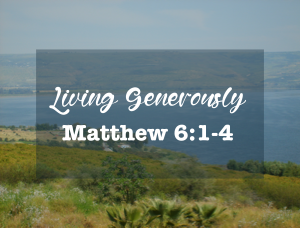The Power of Meekness: A Deeper Look at Matthew 5:5
Big Idea:
Meekness brings order from chaos and joy to the soul.
In a society that values boldness, assertiveness, and the pursuit of personal success, the concept of meekness appears to be an anomaly. However, in Matthew 5:5, Jesus declares, "Blessed are the meek, for they will inherit the earth." This seemingly counter-cultural statement invites us to delve into the true meaning of meekness, a trait often misunderstood and undervalued. Let’s explore the significance of meekness, its biblical foundation, and how it plays a transformative role in the lives of believers.
Defining Meekness
Before we can fully grasp the depth of Jesus's message, we need to understand what meekness truly means. Contrary to common misconceptions, meekness is not synonymous with weakness. Rather, it is strength under control. Meek individuals possess the power to assert themselves but choose humility and submission. In a culture that reveres the bold and assertive, meekness stands out as a powerful force that comes from a place of inner strength.
Jesus as the Epitome of Meekness
To comprehend the essence of meekness, we look to the ultimate example – Jesus Christ. In Matthew 11:29, Jesus describes himself as "gentle and lowly in heart," embodying meekness in its purest form. Throughout His ministry, Jesus demonstrated meekness by choosing servanthood over entitlement, giving over receiving, and ultimately, sacrificing His life for the redemption of humanity.
Biblical Foundations of Meekness
Meekness is a recurring theme in the teachings of Jesus. In Philippians 2, we see the contrast between the power Jesus possessed and His meek manifestation as a servant. He consistently emphasized giving rather than taking, losing for the sake of gaining, and the principle that the last shall be first. These teachings challenge societal norms and encourage a shift from self-centered living to a life characterized by meekness.
The Transformative Power of Meekness
As Jesus addresses the common people in Matthew 5, He introduces a radical way of living – a life marked by spiritual richness, mourning over sin, and most notably, meekness. Proverbs 16:32 reinforces the idea that meekness is mightier than a conquering army. Meekness, in the biblical context, involves God cleansing the sinful soul, taming temper, subduing assertiveness, and bringing order to the chaos within.
Developing Meekness through the Spirit
To understand how God develops meekness in our lives, we turn to Galatians 5. This passage highlights the contrast between living by the Spirit and living by the flesh. Meekness, according to this biblical perspective, is a fruit of the Spirit, evident in those who submit to God's will rather than their own desires. It is a continuous choice between yielding to the Spirit for a harmonious and purposeful life or succumbing to the flesh, leading to discord and frustration.
The Prodigal Son: A Parable of Meekness
Jesus illustrates the transformative power of meekness through the parable of the prodigal son in Luke 15. Both sons initially lived according to the flesh – one demanding his inheritance, the other obeying rules without true joy. It is the repentance and humility of the younger son, acknowledging his spiritual poverty and seeking a lowly position, that exemplifies meekness. This parable reinforces Jesus' message of blessedness for the meek.
Application of Matthew 5:5
As we reflect on Jesus' teaching on meekness, it's essential to consider its practical application in our lives. There are three distinct ways people live – by the flesh in rebellion, by the flesh in legalism, or by the Spirit in meekness.
Rebellious Living: Some live like the prodigal son, making their own paths, demanding their own way, and pursuing self-centered desires. This rebellious living often leads to ruin and emptiness.
Legalistic Living: Others resemble the elder brother, seemingly obedient but lacking joy, abundance, and fruitfulness. This legalistic living, akin to the Pharisees' hypocrisy, denies the transformative power of meekness.
Meek Living: True meekness emerges in those who, like the repentant prodigal son, recognize their spiritual poverty, mourn over sin, and submit to God's ways. This lifestyle leads to a profound understanding of Jesus' declaration – "Blessed are the meek, for they shall inherit the earth."
Encouragement for Every Heart
Regardless of where individuals find themselves on this spectrum, there is a universal call to repentance. For those in rebellion, repentance is a call to turn away from self-centered living. For those in legalism, it is a call to relinquish pride and rejoice in the work God is doing in others. For those embracing meekness, the call is to continue in brokenness, to repent often, and to submit continually to the Spirit of God.
Conclusion
In a world that exalts self-sufficiency and assertiveness, Jesus' proclamation on meekness challenges our cultural norms. Blessed are the meek, for they inherit the earth – a promise that extends beyond worldly success to a life transformed by the power of God. Meekness, far from weakness, is a strength under divine control, a force that brings order to chaos and joy to the soul. As we navigate our journey of faith, may we embrace the transformative power of meekness and experience the blessed inheritance promised by our Savior.
Small Group Questions:
How does society's perception of meekness differ from the biblical understanding presented in the blog post?
In what ways can we see meekness as strength under control in our daily lives?
Reflect on a time when you struggled with either rebellious living, legalistic living, or embraced meek living. How did it impact your spiritual journey?
How does the parable of the prodigal son illustrate the transformative power of meekness?
Discuss practical ways to cultivate meekness in our lives in a culture that values assertiveness.
Galatians 5 contrasts living by the Spirit and living by the flesh. How can we actively choose to walk in the Spirit and develop the fruit of meekness?
As a group, brainstorm ways to encourage and support one another in embracing a meek lifestyle, especially in challenging situations.
If you want to learn more about how to live a life shaped by meekness, Shepherd Thoughts exists to help you live out your faith. If you or a friend needs support or resources to love God and love others more, please reach out to us today. We’d love to help.
























